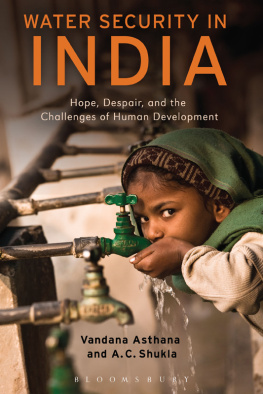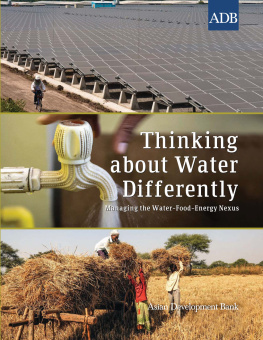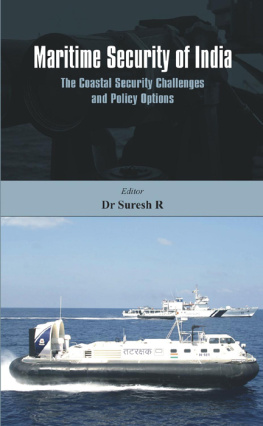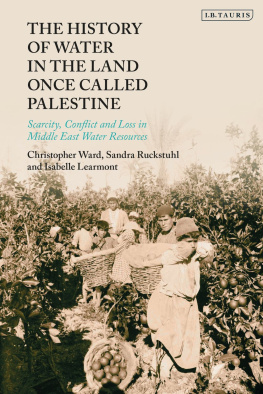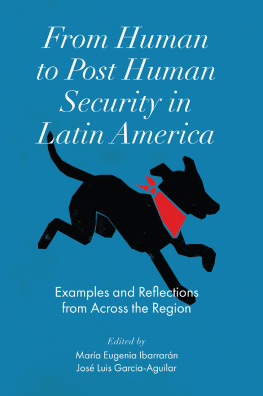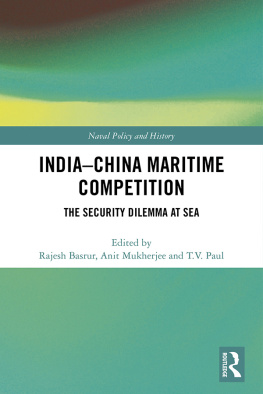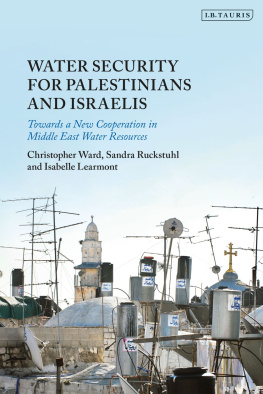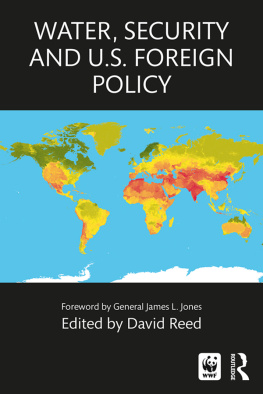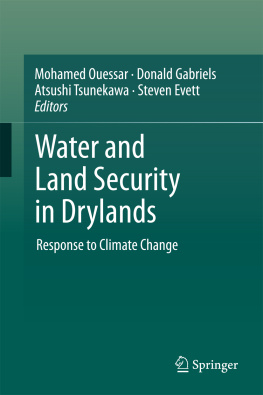Water Security
in India
Few people actively engaged in Indias water sector would deny that the Indian subcontinent faces serious problems in the sustainable use and management of water resources. Water resources in India have been subjected to tremendous pressures from increasing population, urbanization, industrialization, and modern agricultural methods. The inadequate access to clean drinking water, increase in water related disasters such as floods and droughts, vulnerability to climate change, and competition for the resource amongst different sectors and the region poses immense pressures for sustainability of water systems and humanity.
Water Security in India addresses these issues head on, analyzing the challenges that contemporary India faces if it is to create a water-secure world, and providing a hopeful, though guarded, road-map to a future in which Indias life-giving and life-sustaining fresh water resources are safe, clean, plentiful, and available to all, secured for the people in a peaceful and ecologically sustainable manner.
Water is the elixir of life and a building block of mother earth. Only when taps run dry does one realize how critical access to water is for human survival. In less prosperous countries of South Asia, like India and its neighbors, millions of people need no such reminder. People walk miles every single day in search of water that they need to carry home to run their households and save their families from thirst and hunger. Yet the challenge of maintaining the sustainable use of this natural resource has not received the primacy it deserves.
As India continues to grow and transform from agricultural to technoindustrial economy, the pace of economic development has continued with little regard for the carrying capacity of its natural resource base. The demand for water has increased with the surge in population, industrialization, and urbanization. With degrading farmland, little available freshwater, and increasing energy demands in an industrializing economy, India stands at the threshold of environmental insecurity. The challenges to mitigate the ill impacts of climate change at this point in time are also looming large for policy makers and institutional bodies. A comprehensive analysis of these issues and their interconnectedness to security is essential to meet these human and developmental challenges. The ensuing book weaves these issues into a narrative that encompasses the paramount significance of this resource for life, livelihood, ecology, and security.
In this book, we as authors have chosen to explain water security as an approach based on the concept of human security (a buzzword in the security literature) to counterbalance the competitive behavior of the statecentric approach of conventional security and focus on people as the referent object of security. In this approach, the scale of concern is local: it is the individual, not the state, who is to be secured from the risk that arises from environmental change. So, we begin where the traditional security emphasis ends. Our emphasis on water security emerges from environmental security, a subset of human security, which arose as a result of the changes in strategic circumstances at the end of the cold war and as a broadening of the nontraditional human security approach. The book focuses on the interactions between the people and the environment, in this case, water, and the insecurities that arise out of these interactions. The entities to be secured are water and the people, both of which are components of the natural environment; the source of risk is from human activity and environmental/water change, and the scale of concern is local and specifically focused on water ecosystems. Therefore within human/environmental security interpretations, our concern is not the nation-state but the changes in the natural environment that affect the individual.
While the linkage between water and its security implications has been a matter of great concern and contestation among academicians and experts in the security discourse, there is, however, a consensus that as climate changes and the dynamics of demographic pressures and resource scarcity increase in the foreseeable future, the chances of a water-insecure world should not be underestimated. In addition, given the geostrategic environment in which India is placed as a regional hegemon, one needs to acknowledge the importance of water from a national security perspective due to the legacy of partition, historical rivalries, and trust deficit that makes water issues in this part of the world sometimes intractable and a source of regional tension. However, violence over water is an irrational and ineffective means by which to address the development challenges that contemporary India faces if it is to create a water-secure world. The authors believe that efforts should be made on the regional level to enhance our understanding of the potential to be a part of an integrated ecosystem that encompasses issues of equity and sustainable development.
Water Security in India: Hope, Despair, and Challenges of Human Development addresses these issues head-on, analyzing the challenges that contemporary India faces if it is to create a water-secure world, and providing a hopeful, though guarded, road map to a future in which Indias life-giving and life-sustaining fresh and marine water resources are safe, clean, plentiful, and available to all, secured for the people in a peaceful and ecological manner.
A word of thanks is due to all those people and institutions whose support, input, and knowledge have helped the authors to complete this book. The authors are grateful in particular to Eastern Washington University, Office of the Provost, Office of the Dean, College of Social and Behavioral Sciences and Social Work, and the Government and International Affairs Program for the support extended to complete this project. Thanks are also due to Professor Geoffrey Gooch, Director, UNESCO Center for Water Law, Policy and Science, University of Dundee, Scotland, for providing facilities and access to a wide variety of resources that contributed to the completion of this project. A special word of thanks to Richard A. Matthew, professor at the School of Social Ecology, and the founding director, Center for Unconventional Security Affairs, University of California, Irvine, for being a gracious host and for his insightful comments and suggestions on the draft chapters that helped us improve upon the final manuscript. I would also like to acknowledge the Central Water Commission and Water Resources Information System (WRIS) of India for granting the permissions to use the maps in the book. The book could not have been complete without the help of Gail Hapke, who assisted in editing the drafts, and Manisha Sinha, in drawing the figures and tables.


